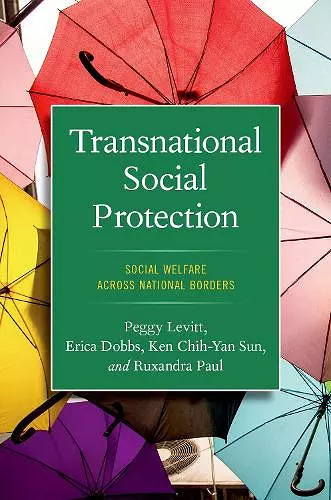Transnational Social Protection
Social Welfare across National Borders
Peggy Levitt author Ken Chih-Yan Sun author Ruxandra Paul author Erica Dobbs author
Format:Hardback
Publisher:Oxford University Press Inc
Published:22nd May '23
Currently unavailable, and unfortunately no date known when it will be back
This hardback is available in another edition too:
- Paperback£20.99(9780197666838)

This book explores the emergence of transnational social welfare arrangements, highlighting how migrants navigate diverse protections across borders, reshaping our understanding of social rights beyond traditional national frameworks.
Transnational Social Protection explores the evolution of social welfare systems in response to increasing global mobility. The authors, Peggy Levitt, Erica Dobbs, Ken Chih-Yan Sun, and Ruxandra Paul, argue that traditional social welfare models, which are based on national citizenship and residence, are becoming outdated. As more individuals live, work, study, and retire outside their home countries, the conventional notion of social rights tied to geographical location is being challenged.
The book introduces the concept of a resource environment, which illustrates how migrants and their families navigate various sources of support across different contexts. The authors highlight the diverse ways in which social protections are assembled, emphasizing that these arrangements can differ significantly based on location and time. This approach underscores the complexity of modern social welfare and the necessity for a broader understanding of how individuals access essential services like health care, education, and elder care.
Furthermore, the authors present a new hybrid model of transnational social protection that has emerged as a response to changing global dynamics. This model complements and sometimes replaces traditional national welfare systems, adapting to the realities of migration and mobility in contemporary life. By shifting the focus from national to transnational frameworks, Transnational Social Protection offers valuable insights into the future of social welfare, highlighting the need for policies that reflect the interconnected nature of today's world.
This book moves the field forward in several ways. First, it asks important central questions: How do people gain access to social protections within the context of migration? How do they negotiate such protections for themselves and their families as they reside in places offering markedly different levels of or exclusion from state offered social protection? or as they move through the life course? Second, it uses but also notes how much prior research on transnationalism or state-centered social protections cannot fully describe how migrants and their families seek to access such social protections. Finally, and critically, they use empirical fieldwork-based evidence to describe and analyze how these families create resource environments seeking access to social protections. They effectively ground and develop their theoretical arguments with data and cases. An important contribution. * Robert Smith, Baruch College and Graduate Center, CUNY *
This book is the first that introduces a framework to analyze how migration reconfigures social protection transnationally, and what policy and social changes are needed. Based on a wide range of empirical cases from across the world, this pioneering synthesis is an important intervention into the global debates on social welfare now. * Biao Xiang, Max Planck Institute for Social Anthropology *
Individuals in the transnational world painstakingly documented in this book can no longer triangulate based on citizenship, geography, or even local community. Whether in the area of political rights, education, health, or work, the authors provide salient and sobering insight into what determines social welfare for the millions of people without residence. * David Weil, Heller School for Social Policy, Brandeis University *
This book is an essential reference point in academic and policy debates on transnational social protection and the need to rethink the structures for the provision of social welfare and access to rights across borders given the realities of human mobility in a global context of neoliberalism, inequality, deindustrialization and austerity. * Alexandra Délano Alonso, Associate Professor of Global Studies, The New School *
More and more people are citizens of one country but live and work in another. How do they obtain social protections? How do they manage the vagaries of work, health, and the law? What roles are played by governments, communities, non-profits, families and friends? In Transnational Social Protection, Levitt, Dobbs, Sun, and Paul provide deeply researched answers to these questions. They develop the idea of Hybrid Transnational Social Protections (HTSP) and via case studies and data offer new and compelling insights on migration from the perspective of families struggling to make do in a complicated world. * Paul Osterman, NTU Professor, MIT Sloan School *
This book is a must-read for scholars and practitioners struggling to make sense of the 'triple-win' migration and development discourse. It offers a transnational multi-sectoral approach to thinking afresh about the roles of states, markets, the third sector, and social networks and families in securing migrant rights and protections in a world fragmented by the power of economic nationalism. * Brenda Yeoh, National University of Singapore *
The great increase in migration today poses one of the greatest challenges to the nation-state as a basis for social policy. Sociologist T. H. Marshall posited an extension of citizens' claims on their national governments as a historical progression in individual-social relations. Recommended. General readers through faculty; professionals. * Choice *
ISBN: 9780197666821
Dimensions: 156mm x 235mm x 18mm
Weight: 467g
234 pages